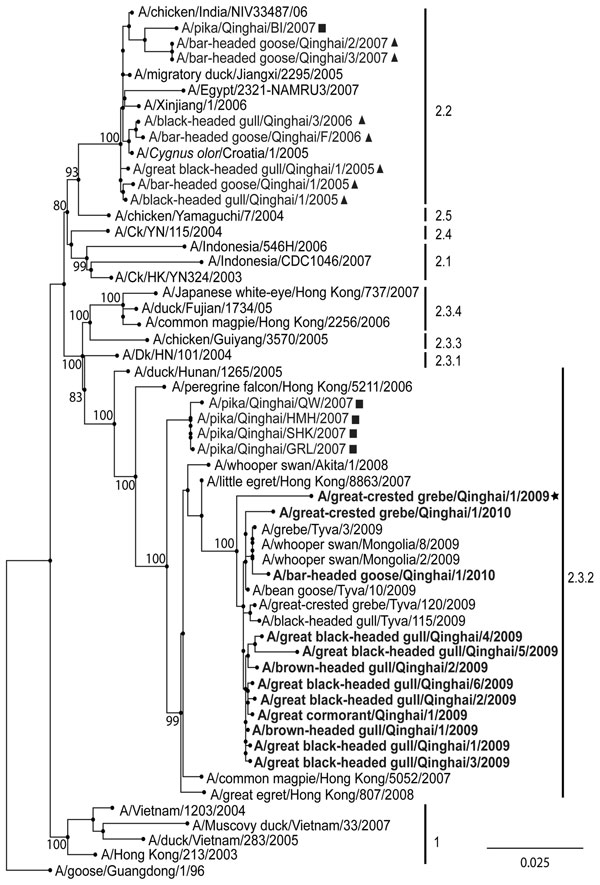Clade 2.3.2 Avian Influenza Virus (H5N1), Qinghai Lake Region, China, 2009–2010
Xudong Hu, Di Liu, Mingyang Wang, Le Yang, Xiaoping Tang, Qingyu Zhu, Laixing Li, and George F. Gao

Author affiliations: Author affiliations: China Agricultural University College of Veterinary Medicine, Beijing, People’s Republic of China (X. Hu, Ming Wang, G.F. Gao); Chinese Academy of Sciences (CAS) Key Laboratory of Pathogenic Microbiology and Immunology Institute of Microbiology, Beijing (X. Hu, D. Liu, Mingyang Wang, G.F. Gao); Graduate University CAS, Beijing (Mingyang Wang, G.F. Gao); Northwestern Institute of Plateau Biology CAS, Xining, China (L. Yang, L. Li); Tibet Plateau Institute of Biology, Lhasa, Tibet Autonomous Region, China (L. Yang); State Key Laboratory of Pathogens and Biosecurity Academy of Military Medical Sciences, Beijing (Q. Zhu); Beijing Institutes of Life Sciences CAS, Beijing (G.F. Gao)
Main Article
Figure

Figure. Bootstrapped (1,000×) maximum likelihood phylogenetic tree of hemagglutinin genes of avian influenza viruses (H5N1), People’s Republic of China, 2009–2010. Viruses isolated from the plateau pika near Qinghai Lake are indicated by squares; viruses isolated from wild birds in Qinghai Lake Region during 2005–2007 are indicated by triangles; 2009 Qinghai virus submitted to GenBank by the National Avian Influenza Virus Reference Laboratory (Harbin, China) is indicated by the star and in boldface; and viruses isolated in 2009 and 2010 in the Qinghai Lake Region are indicated in boldface, Clade numbers are indicated on the right. NAMRU3, Naval Medical Research Unit 3; Ck, chicken; Dk, duck. Scale bar indicates nucleotide substitutions per site.
Main Article
Page created: July 25, 2011
Page updated: July 25, 2011
Page reviewed: July 25, 2011
The conclusions, findings, and opinions expressed by authors contributing to this journal do not necessarily reflect the official position of the U.S. Department of Health and Human Services, the Public Health Service, the Centers for Disease Control and Prevention, or the authors' affiliated institutions. Use of trade names is for identification only and does not imply endorsement by any of the groups named above.
